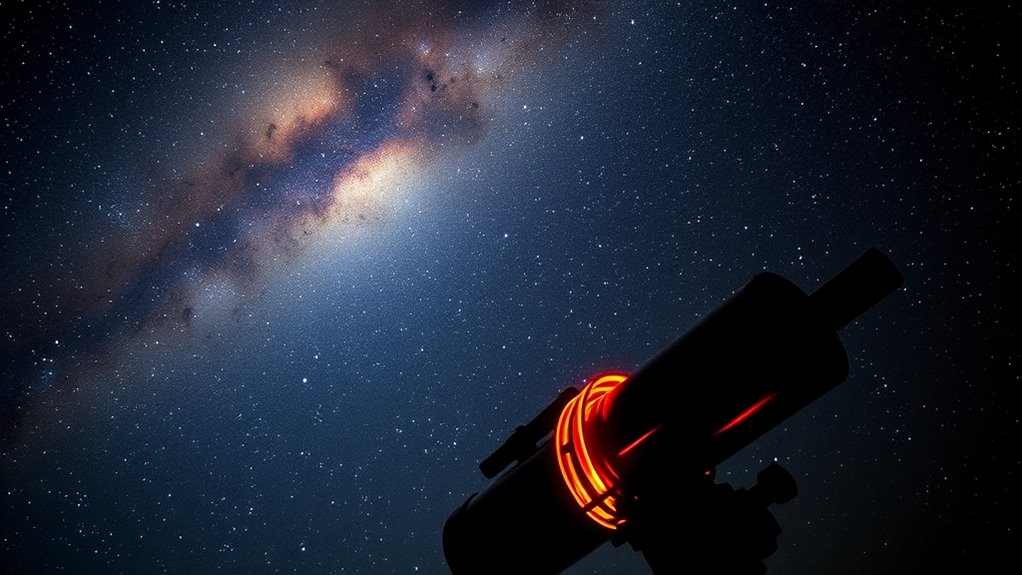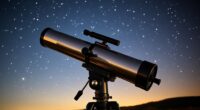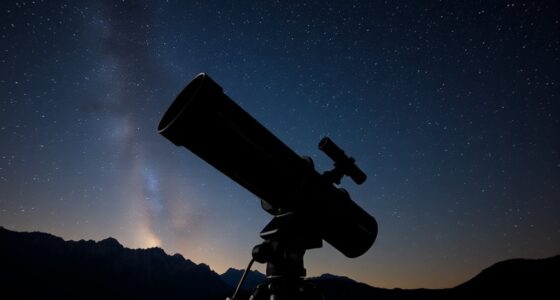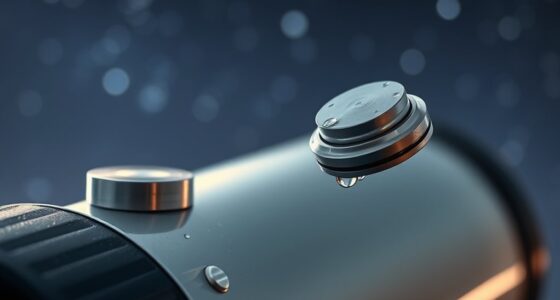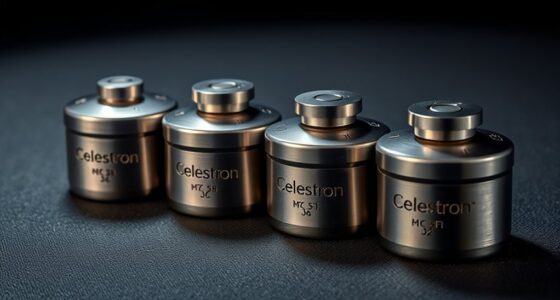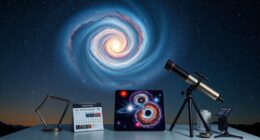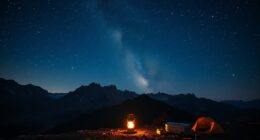If you’re looking to keep your telescope clear during milky way photography, I recommend checking out the top dew heaters like the JJC USB Lens Warmer, Astromania, Neewer, and Dew Heater Strips. These models offer adjustable heat, easy fit, and reliable power options, perfect for cold, humid nights. I’ll guide you through more options and what to contemplate so you can choose the best one for your outdoor sessions.
Key Takeaways
- Choose dew heaters compatible with your lens or telescope size, such as models for up to 80mm or 16-inch circumference.
- Prioritize heaters with adjustable temperature settings and rapid heating capabilities for reliable dew prevention.
- Opt for USB-powered or 12V systems for versatile outdoor use with portable power sources like batteries or power banks.
- Ensure the dew heater offers secure, adjustable straps like Velcro for easy installation on various astrophotography accessories.
- Consider durability and weatherproof features to withstand cold, humid, and damp outdoor conditions during night sky imaging.
JJC USB Lens Warmer for 80mm Lenses
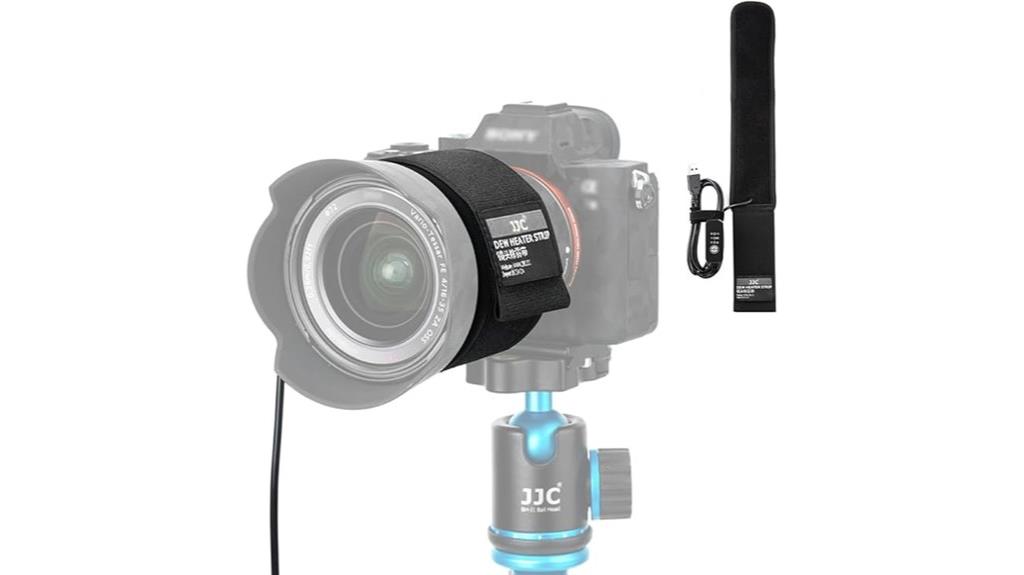
If you’re looking for an effective dew heater that’s easy to use during astrophotography sessions, the JJC USB Lens Warmer for 80mm lenses is a great choice. I appreciate its simple design and versatility, fitting lenses up to 80mm in diameter. It heats quickly and prevents condensation, so my images stay clear even in cold conditions. The adjustable heat levels let me customize the warmth, and the USB power makes it convenient for long nights outdoors. Plus, I’ve used it to insulate thermos bottles and cups, proving its multifunctionality. Overall, it’s a reliable, user-friendly solution for keeping my lenses fog-free.
Best For: outdoor astrophotographers and telescope users seeking an easy-to-use, effective dew prevention solution for lenses up to 80mm in diameter.
Pros:
- Quick and efficient heating to prevent lens condensation in cold environments
- Adjustable heat levels for customized temperature control
- USB-powered, allowing use with portable power banks for long outdoor sessions
Cons:
- Designed specifically for lenses up to 80mm, limiting use with larger equipment
- May require additional accessories for optimal connection to certain power sources
- Limited to temperature regulation for lenses and small items, not suitable for larger heating needs
Astromania USB Lens Warmer Heater for Telescope and Camera
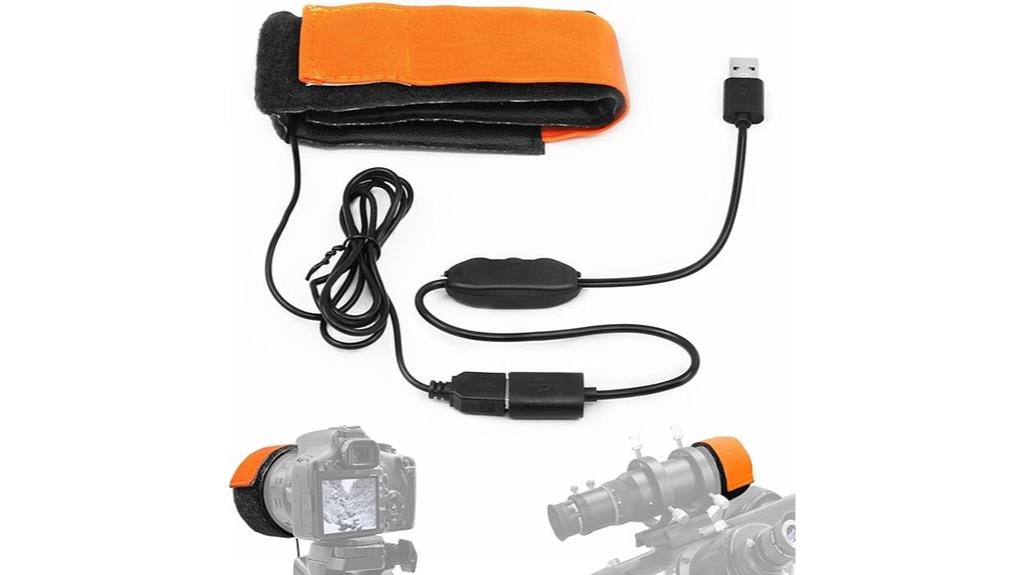
The Astromania USB Lens Warmer Heater stands out as a versatile and portable option for astrophotographers and amateur astronomers who need reliable dew prevention. Designed for lenses up to 80mm in diameter, it fits most telescopes and cameras easily thanks to its adjustable Velcro strap. The heater measures just over 6 inches long and weighs about 3.2 ounces, making it lightweight and easy to carry. Its stepless temperature regulator allows precise control, helping prevent fogging during humid or cold conditions. Powered via USB, you can connect it to a power bank for outdoor convenience. Overall, it’s a practical, adjustable solution to keep your optics clear during long night sessions.
Best For: amateur astronomers and astrophotographers seeking an affordable, portable dew prevention solution for lenses up to 80mm in diameter.
Pros:
- Easy to attach securely with adjustable Velcro strap for various lens sizes.
- USB-powered design allows flexible use with power banks and portable sources.
- Adjustable stepless temperature control provides precise and customizable heat levels.
Cons:
- Heating capacity may be limited in extremely cold conditions, raising only about 20-25°F above ambient.
- The stiff Velcro strap might not conform perfectly to all lens shapes or sizes.
- Lack of detailed instructions may require some trial and error for optimal temperature settings.
NEEWER USB Lens Heater for DSLR Camera and Telescope
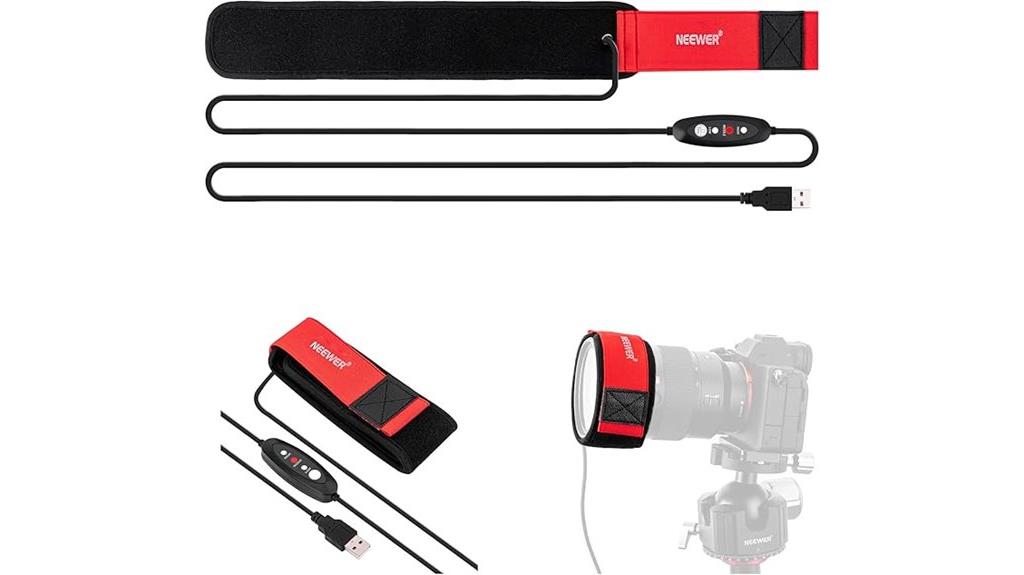
For astrophotographers seeking an effective and portable solution to prevent dew on lenses and telescopes, the NEEWER USB Lens Heater stands out. It’s compatible with DSLR cameras and telescopes up to 10.8 inches in circumference, offering even heating with three adjustable temperature levels. Its lightweight design (just 3.53 ounces) and 1.5-meter USB cable make it easy to use indoors or outdoors. The touch fastener strips allow for quick, secure wrapping around your gear, while the adjustable heat settings ensure ideal dew prevention. Whether for astrophotography or other cold-weather needs, this heater is versatile, compact, and highly rated by users.
Best For: astrophotographers and outdoor enthusiasts seeking a portable, efficient dew prevention solution for DSLR lenses and telescopes up to 10.8 inches in circumference.
Pros:
- Adjustable temperature levels (high, middle, low) for customized heat control.
- Lightweight and compact (only 3.53 ounces), making it easy to carry and use outdoors.
- Easy to install with touch fastener strips for quick, secure wrapping around lenses or telescopes.
Cons:
- Requires a 5V 2A USB power source, which may necessitate additional adapters or portable chargers.
- Limited to lenses and telescopes with a maximum circumference of 10.8 inches; not suitable for larger equipment.
- The heating length (12/300mm) may not cover very large lenses or scopes completely in some cases.
Dew Heater Strip – 6.5 Length # DN02
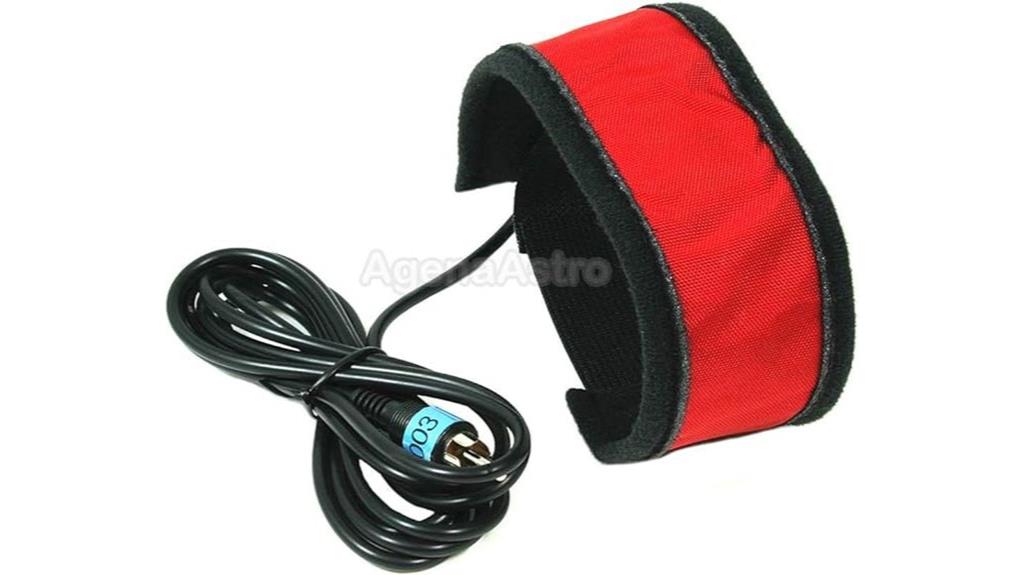
Photographers capturing the Milky Way will appreciate the Dew Heater Strip – 6.5 Length # DN02 for its precise fit and reliable dew prevention on smaller optical accessories. Made in the USA by AFAB, this compact heater is designed for devices like eyepieces, finderscopes, or small telescopes up to 16 inches. It operates at 12 volts, providing even heat distribution to avoid hot spots and burnouts, while feeling barely warm during use. With over 30 patents and 20+ years of development, the DN02 offers durability, efficiency, and confidence that your gear stays clear of dew, ensuring sharp, unobstructed night sky imaging.
Best For: amateur astronomers and astrophotographers seeking reliable dew prevention for small optical accessories like eyepieces, finderscopes, and compact telescopes up to 16 inches.
Pros:
- Precise fitting for smaller optical devices, ensuring effective dew prevention
- Even heat distribution prevents hot spots and burnouts
- Compact, lightweight design with durable construction backed by over 30 patents
Cons:
- Requires a separate 12V power supply with compatible connectors
- Not suitable for larger telescopes or devices exceeding 16 inches in aperture
- Does not include power cords or control units, necessitating additional equipment
JJC USB Lens Warmer for Telescopes and Mirrorless Camera Lenses
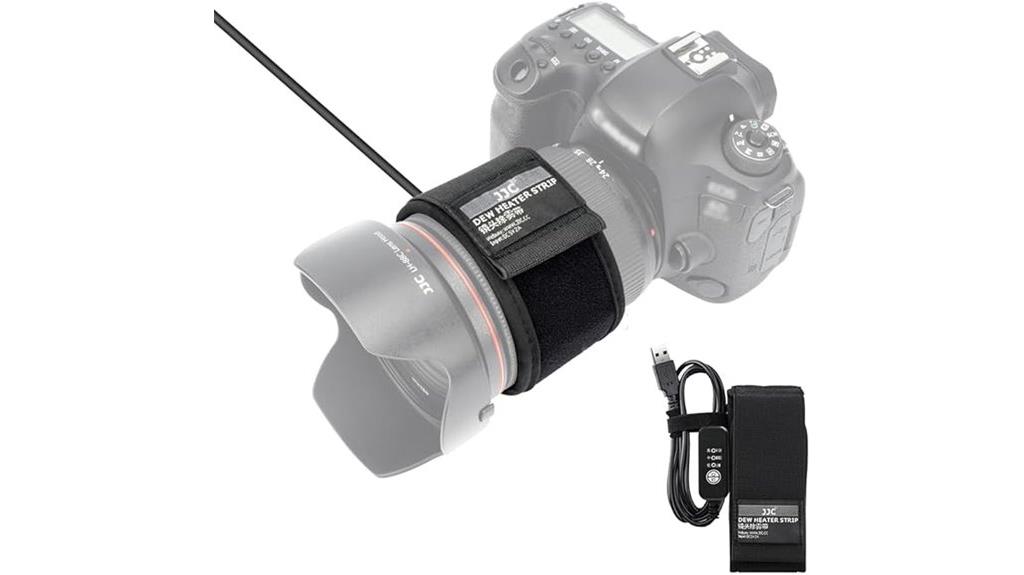
If you need a reliable solution to prevent condensation on your telescope or mirrorless camera lenses during cold night shoots, the JJC USB Lens Warmer is an excellent choice. It fits lenses with diameters from 80mm to 110mm and effectively warms the surface to avoid fogging. Made from high-quality materials, it provides rapid heat transfer and insulation, even in temperatures as low as -40°C. Powered via USB, it’s compatible with power banks, making it perfect for outdoor astrophotography sessions. The adjustable temperature levels ensure ideal performance, while its quick installation allows seamless use during long nights under the stars.
Best For: photographers, astronomers, and outdoor enthusiasts who need to prevent lens fogging and keep beverages warm in extremely cold conditions.
Pros:
- Effectively prevents condensation and fogging on telescopes and camera lenses during cold weather.
- Powered via USB, compatible with power banks for convenient outdoor use.
- Adjustable temperature settings and quick installation for versatile and user-friendly operation.
Cons:
- Designed specifically for lenses with diameters between 80mm and 110mm, limiting compatibility with smaller or larger lenses.
- Requires a USB power source, which may not be as convenient in areas without accessible USB outlets.
- May add some bulk to lens setup, potentially affecting portability for minimalist users.
Dew Heater for Camera Lenses (LOSHARP Lens Heater)
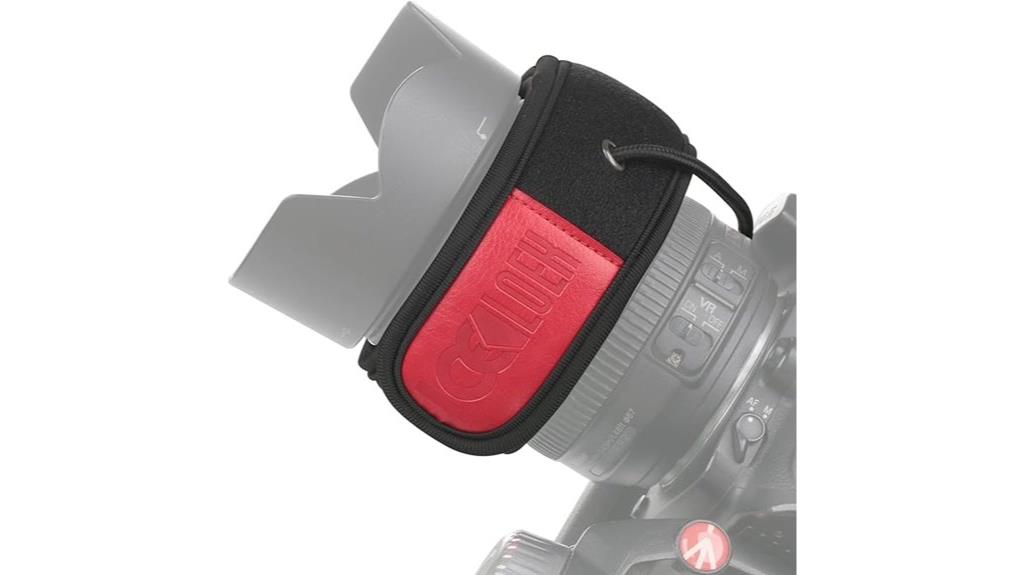
The LOSHARP Lens Heater stands out as an excellent choice for outdoor enthusiasts who need reliable, quick-acting dew prevention on camera lenses and telescope eyepieces. It heats rapidly to 122°F (50°C) and maintains effective defogging at around 86°F (30°C), preventing fogging even in cold, humid conditions. Compatible with most finders, lenses, and eyepieces, it’s easy to install with adjustable velcro straps. Powered via USB from power banks or adapters, it’s lightweight and portable. Users appreciate its quick warm-up, consistent performance, and straightforward design, making it a practical, cost-effective solution for keeping your gear clear during outdoor night photography.
Best For: outdoor photographers, astronomers, and telescope users seeking a reliable, quick-acting dew prevention solution for lenses and eyepieces in cold or humid conditions.
Pros:
- Heats rapidly to 122°F (50°C) and maintains effective defogging at around 86°F (30°C)
- Compatible with most finders, lenses, and eyepieces, and easy to install with adjustable velcro straps
- Powered via USB, making it lightweight, portable, and suitable for outdoor use with power banks or adapters
Cons:
- Lacks an on/off switch or temperature controls for precise adjustment
- Short wire length may limit flexibility during setup
- No power indicator light, which can make monitoring battery levels or device status difficult
Astromania 40cm Telescope Lens Dew Heater Strip
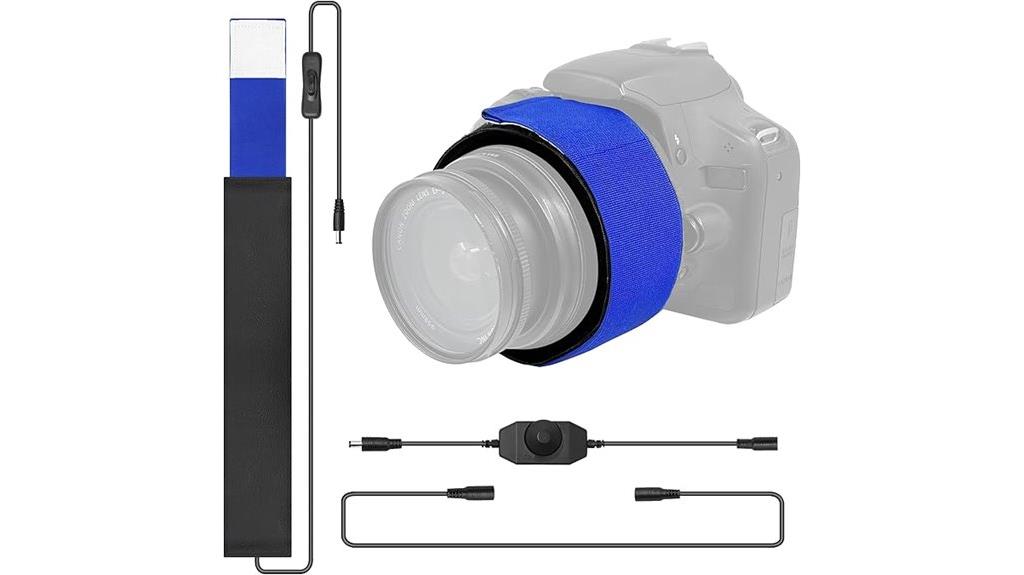
When searching for a reliable dew heater strip that offers precise control, the Astromania 40cm Telescope Lens Dew Heater Strip stands out with its stepless temperature regulation. You can easily adjust the temperature with the sliding knob, ensuring your lenses stay dew-free in cold or damp conditions. It’s compatible with lenses and devices with outer diameters less than 125mm, making it versatile for telescopes and cameras. The quick disassembly and adjustable length design make installation straightforward, while its lightweight build (just over 3 ounces) ensures portability. Connecting via a standard DC port, it’s a practical choice for field use, helping you capture clear, dew-free astrophotos.
Best For: Amateur and professional astronomers or astrophotographers seeking a reliable, adjustable dew prevention solution for their lenses and telescopes during cold or damp conditions.
Pros:
- Stepless temperature control via sliding knob for precise adjustments
- Compatible with lenses and devices with outer diameters less than 125mm
- Lightweight and portable, ideal for field use and quick installation
Cons:
- Mixed customer reviews with an average rating of 3.5 out of 5 stars
- Limited to devices with specific diameter compatibility, may not fit all equipment
- Requires external power sources like power banks, which may add to setup complexity
COOWOO Lens Heater Warmer Dew Heater Strip with Temperature Regulator
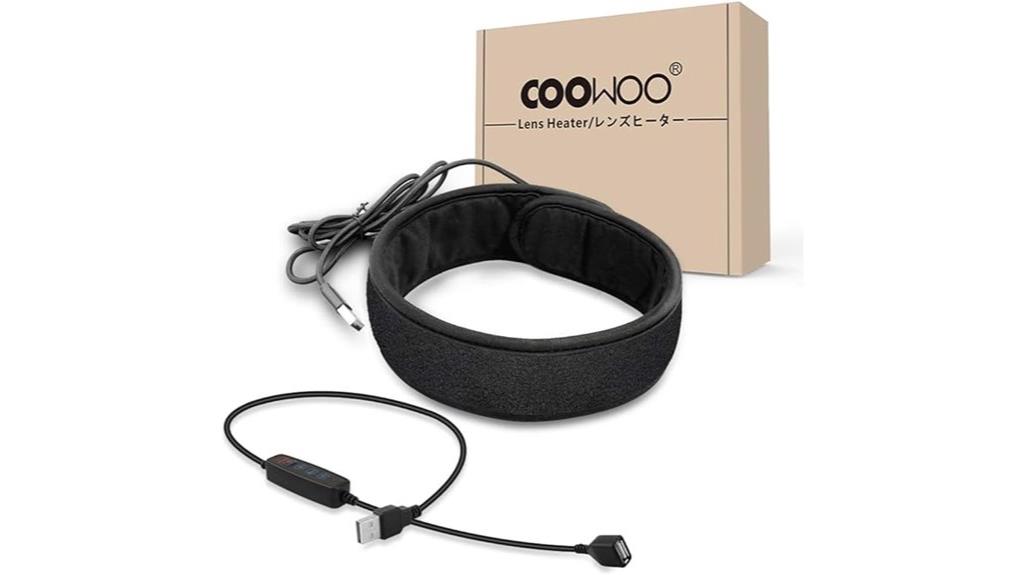
Photographers venturing into astrophotography or outdoor night shoots will appreciate the COOWOO Lens Heater Warmer Dew Heater Strip, especially since it effectively prevents ice and dew buildup on lenses. Made from durable neoprene, polyester, and cotton, it’s designed to fit universal camera and telescope lenses. The strip measures about 43 cm long and includes a 1.5-meter USB cable for easy connection. With an adjustable temperature regulator offering low, medium, and high modes, it heats up to 60°C within minutes. Rated 4.4 stars, users praise its reliable dew prevention, ease of use, and versatility, making it a handy tool for cold and humid conditions.
Best For: outdoor photographers and astrophotographers seeking reliable lens dew prevention in cold, humid conditions.
Pros:
- Effective at preventing ice and dew buildup on camera and telescope lenses
- Easy to operate with adjustable temperature settings and USB power supply
- Durable construction from high-quality neoprene, polyester, and cotton materials
Cons:
- Slightly shorter length than advertised may affect fit on larger lenses
- Heating capacity limited to 60°C, which might be insufficient in extremely cold environments
- Continuous use can drain power banks quickly, requiring frequent recharging
Astromania 40cm Telescope Dew Heater Strip
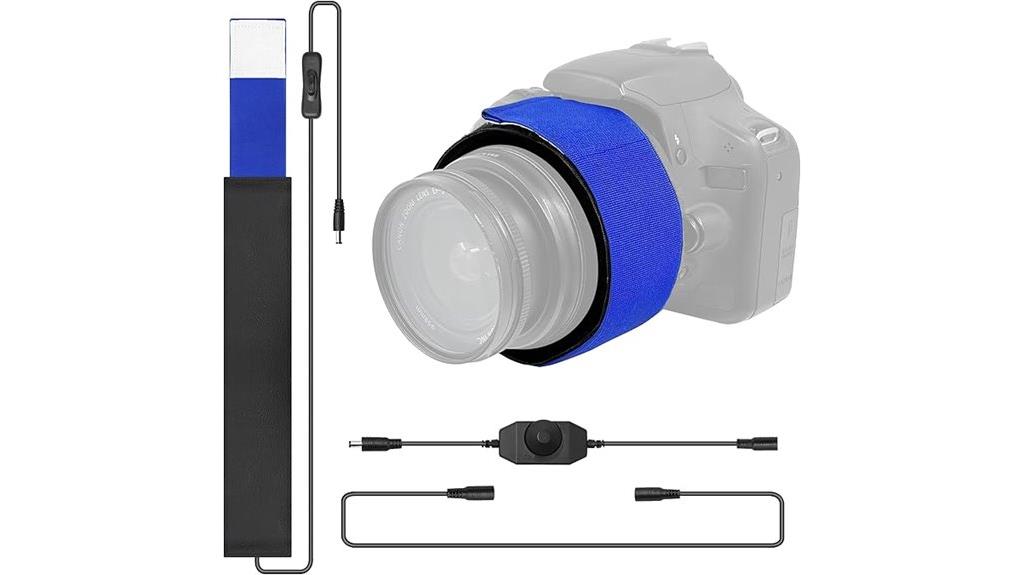
If you’re looking for a reliable dew heater strip compatible with a wide range of lenses and telescopes, the Astromania 40cm Dew Heater Strip is a solid choice. It features stepless temperature regulation via a sliding knob, making it easy to adjust for different conditions. Designed to prevent fogging on digital camera lenses, finder scopes, and telescopes with outer diameters less than 125mm, it keeps your lenses clear during cold or humid nights. The quick-disconnect design and adjustable length ensure a snug fit, and the lightweight build (just 3.2 ounces) makes it portable for field use. Overall, it’s a practical, versatile option for maintaining clear views during astrophotography sessions.
Best For: astronomers and astrophotographers seeking an adjustable, portable dew heater strip compatible with a wide range of lenses and telescopes to prevent fogging during cold or humid conditions.
Pros:
- Stepless temperature regulation allows for precise control via sliding knob.
- Compatible with lenses and devices with outer diameters less than 125mm, covering most telescopes and cameras.
- Lightweight and portable, weighing only 3.2 ounces, ideal for field use.
Cons:
- Mixed customer reviews with an average rating of 3.5 out of 5 stars.
- Limited compatibility to devices under 125mm in outer diameter, not suitable for larger equipment.
- May require external power sources like power banks with the appropriate DC port.
DewNot 3 Dew Heater Strip DN004
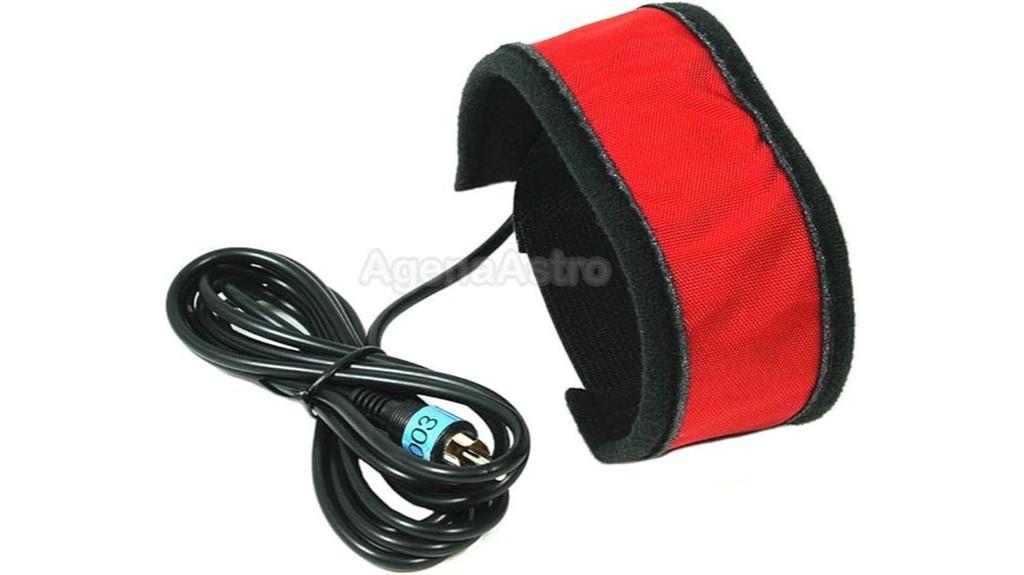
The DewNot 3 Dew Heater Strip DN004 stands out as an excellent choice for amateur and professional astronomers seeking reliable dew prevention for their optical equipment. Made in the USA by AFAB, it’s available in various lengths to fit eyepieces, finderscopes, and telescopes up to 16 inches. Its even heat distribution prevents hot spots and burnouts, while feeling barely warm during operation ensures safety. With over 30 patents and 20+ years of improvements, DewNot offers a durable, cost-effective solution. Proper measurement of your device’s circumference guarantees peak performance. It requires a 12V power supply with an RCA connector for seamless, safe operation.
Best For: Amateur and professional astronomers seeking reliable, safe dew prevention for a variety of optical devices up to 16 inches in size.
Pros:
- Even heat distribution prevents hot spots and burnouts.
- Made in the USA with over 30 patents, ensuring durability and innovation.
- Easy to install with a variety of lengths for different equipment sizes.
Cons:
- Requires a 12V power supply with an RCA connector; not compatible with USB or household outlets.
- Accurate measurement of device circumference is essential for optimal performance.
- Limited to use with devices up to 16 inches; not suitable for larger telescopes.
USB 2-in-1 Telescopes Camera Dew Heater and Shield
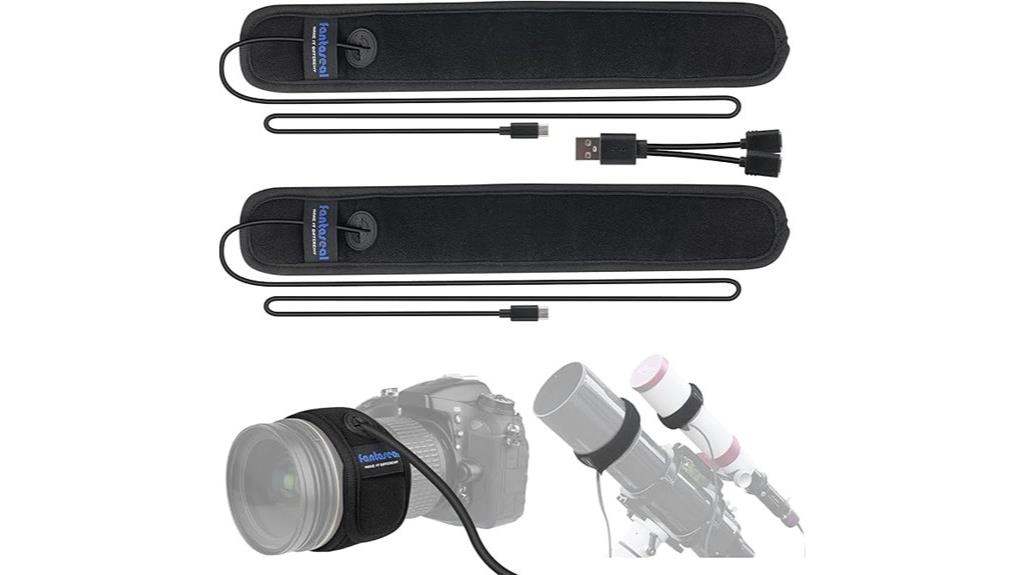
For anyone seeking a versatile and portable solution to prevent lens fogging during Milky Way photography, the USB 2-in-1 Telescopes Camera Dew Heater and Shield stands out. It features double 330mm spliceable dew heater strips with velcro, allowing quick adjustments for lenses up to 6 inches (180mm) in diameter. Made of durable, heat-retentive materials, it heats lenses rapidly within five seconds and maintains warmth to prevent condensation. Powered via USB, it connects easily to power banks for on-the-go use. Its universal design also suits water bottles or wrist straps, making it a flexible tool to keep your equipment clear and your shots sharp in cold conditions.
Best For: photographers and astronomers who need a portable, quick-setup solution to prevent lens fogging during cold weather or outdoor astrophotography sessions.
Pros:
- Rapid heating within five seconds ensures quick fog prevention.
- Adjustable length with spliceable dew heater strips for a customizable fit.
- Versatile design suitable for various lenses, water bottles, and straps.
Cons:
- Limited to lenses up to 6 inches (180mm) in diameter.
- Requires a USB power source, which may not be available in all locations.
- Customer ratings are moderate at 4.1/5 stars, indicating some users may experience issues.
Dew Heater for Camera Lens and Observation Mirrors
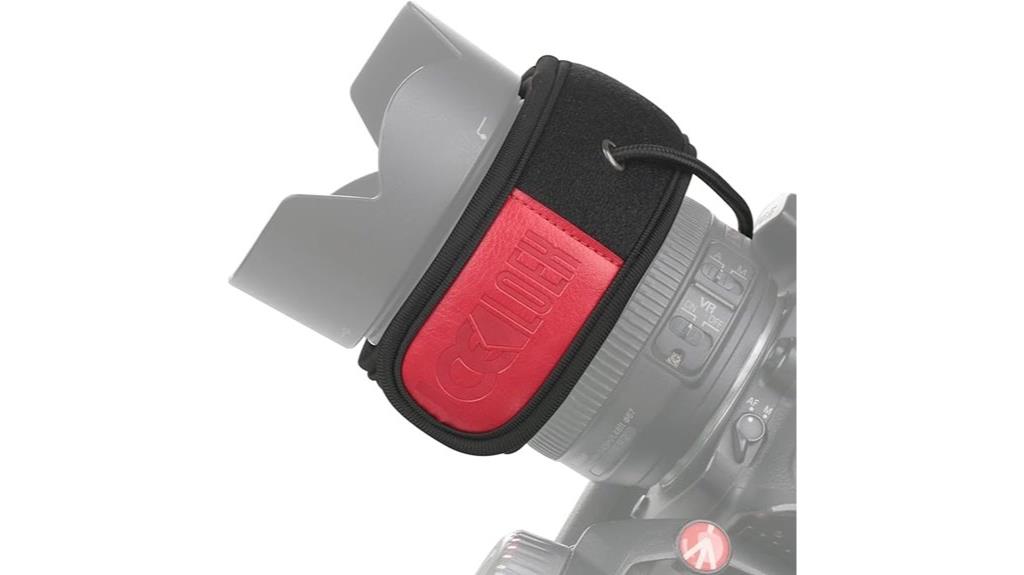
Photographers and astronomers working in cold, humid conditions will find the LOSHARP Lens Heater an essential tool for maintaining clear lenses and observation mirrors. It quickly heats to about 122°F (50°C), effectively preventing fogging and dew buildup on camera lenses, telescope eyepieces, and observation mirrors. Its universal fit with adjustable velcro makes installation straightforward on most equipment, including Canon lenses and 2-inch telescope eyepieces. Powered via USB, it’s portable and easy to use outdoors. The heater is lightweight, compact, and reliable, ensuring you can capture sharp images or observe without interruption, even in the coldest, dampest environments.
Best For: photographers and astronomers in cold, humid environments seeking an easy, reliable solution to prevent fogging and dew on lenses and observation mirrors.
Pros:
- Quick and effective heating to 122°F (50°C) for reliable dew prevention.
- Universal fit with adjustable velcro for easy installation on various equipment.
- Powered via USB, making it portable and convenient for outdoor use.
Cons:
- Lacks an on/off switch or temperature controls for precise adjustments.
- Short wire length may limit flexibility and positioning.
- No power indicator light, making it harder to monitor device status during use.
Comfort Zone Portable Utility Space Heater (CZ798BK)
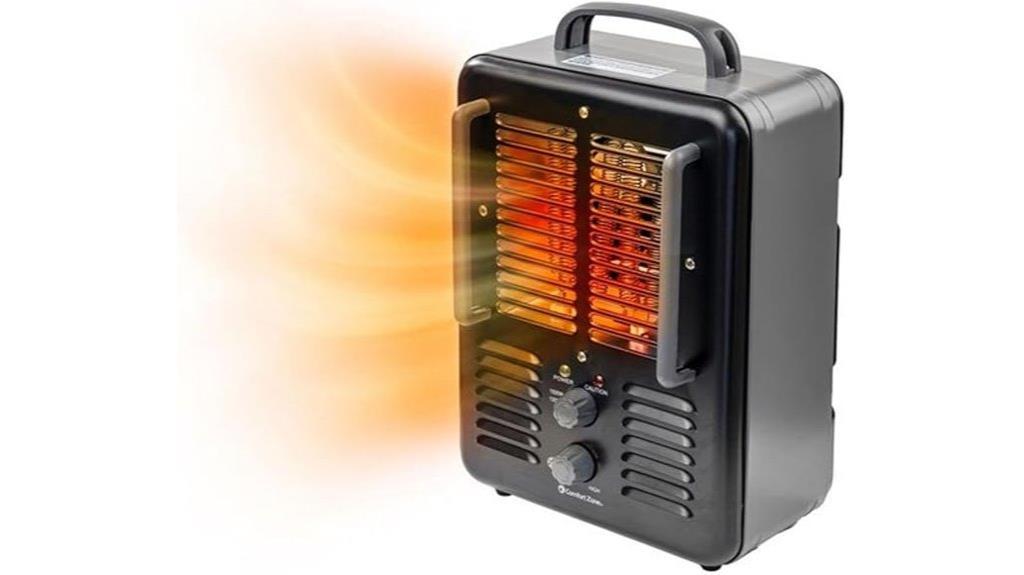
If you need a reliable, portable heater to keep your gear warm during outdoor or unheated indoor Milky Way photography sessions, the Comfort Zone Portable Utility Space Heater (CZ798BK) is a solid choice. It offers 1,500W of adjustable heat, with two settings and a fan-only mode for versatile use. The all-metal housing stays cool to touch, ensuring safety, while features like overheat protection and a tip-over switch add peace of mind. Its compact design, lightweight build, and oversized handle make it easy to move around, whether in a garage, greenhouse, or outdoor space. This durable heater keeps your environment warm without complicating your setup.
Best For: DIY enthusiasts, hobbyists, or outdoor photographers needing portable, reliable heat for enclosed or outdoor spaces during cold weather.
Pros:
- Adjustable heat settings and fan-only mode provide versatile heating options.
- All-metal, cool-touch housing ensures safety and durability during transport and use.
- Lightweight, compact design with an oversized handle makes it easy to move around.
Cons:
- Operates only on 120V, which may limit use in some outdoor or remote locations.
- Coverage area of approximately 300 sq. ft. might be insufficient for larger spaces.
- No remote control or digital thermostat, requiring manual adjustments for temperature control.
Comfort Zone Milkhouse Style Space Heater with Thermostat
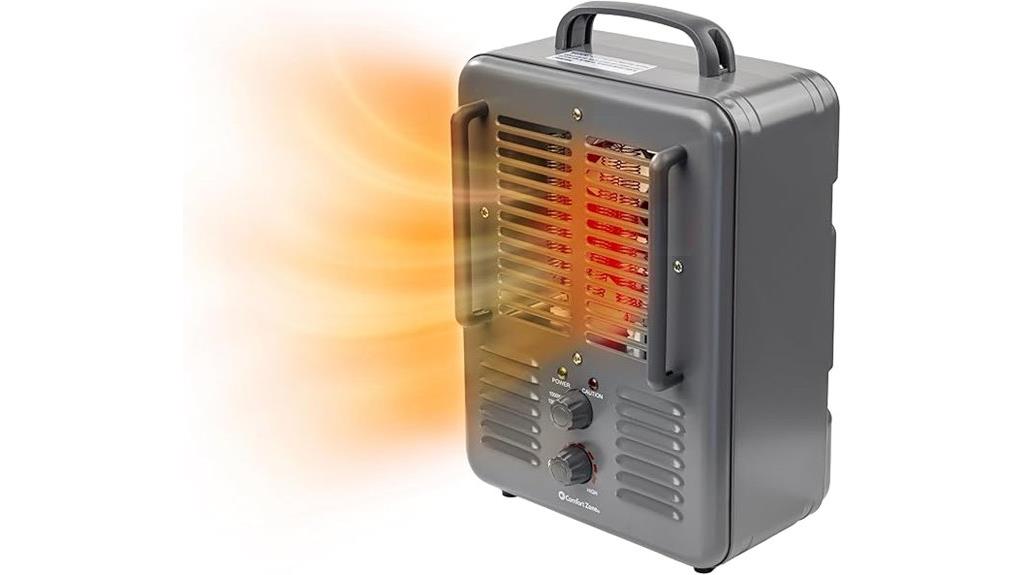
The Comfort Zone Milkhouse Style Space Heater with Thermostat stands out as an excellent choice for those needing reliable, adjustable heating in enclosed spaces. Its 1500W power delivers effective warmth for garages and workshops, helping prevent dew buildup on your telescope. The heater offers three heat settings—low, high, and fan-only—allowing tailored comfort, while the rotary thermostat ensures precise temperature control. Safety features like indicator lights, overheat protection, and a tip-over switch make it safe to use. Its all-metal housing stays cool during operation, and the oversized handle makes it portable. It’s a cost-effective, versatile solution for maintaining a dew-free environment during your astrophotography sessions.
Best For: those seeking a reliable, adjustable, and portable space heater for enclosed garages, workshops, or utility spaces to maintain a comfortable and dew-free environment.
Pros:
- Effective 1500W heating performance ideal for small to medium enclosed spaces
- Adjustable heat settings and thermostat for personalized comfort
- Safety features including tip-over switch, overheat protection, and indicator lights
Cons:
- Limited to indoor use and enclosed spaces only
- May not be suitable for very large or open areas
- Requires electricity, so heating costs depend on usage and local rates
Factors to Consider When Choosing a Dew Heater for Milky Way
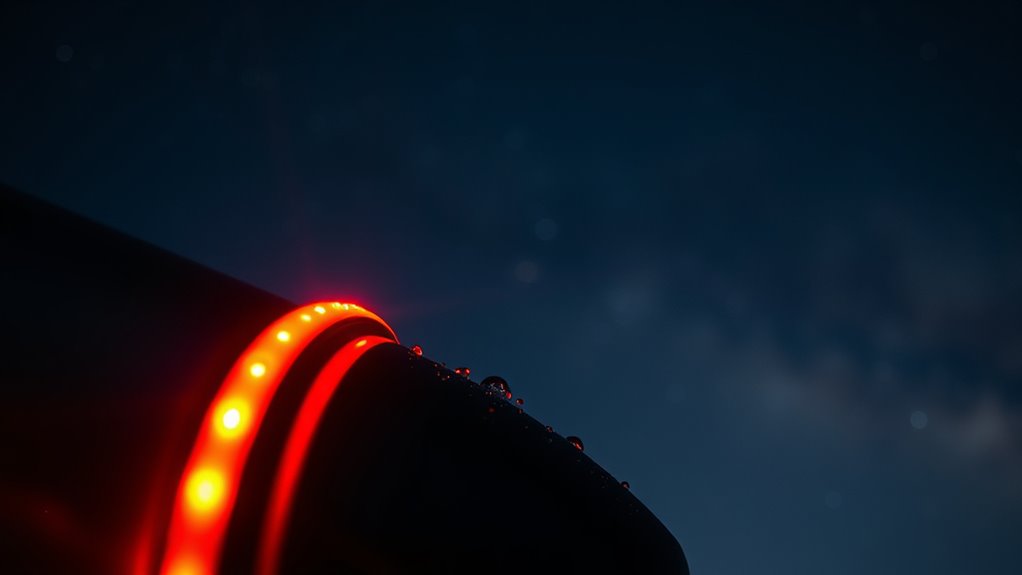
When selecting a dew heater for Milky Way photography, I look at factors like compatibility with my lens size and how quickly it heats. I also consider adjustable temperature controls, power options, and how durable the heater is in different weather conditions. These points help guarantee I choose a reliable, effective solution for clear night sky shots.
Compatibility With Lens Size
Choosing a dew heater that fits your lens size is crucial for effective moisture prevention. You want a heater whose maximum diameter matches or exceeds your lens’s outer diameter to ensure full coverage. Measure your lens or telescope’s outer circumference carefully and compare it with the heater’s length, so you know it’ll wrap properly. Ideally, select a heater that can comfortably go around your lens with some overlap, which helps provide even heating and prevents cold spots that can cause dew. Flexible or adjustable strips are a great choice—they conform to different sizes and make your setup more versatile. Just remember to check the product specifications to confirm it’s designed for your lens’s size. Proper fit ensures ideal performance and keeps your gear dew-free during those critical Milky Way shots.
Heating Power & Speed
To prevent dew formation effectively, selecting a dew heater with the right heating power and speed is vital. Higher wattage heaters warm lenses faster, reaching ideal temperatures quickly and preventing dew before it forms. Faster heating is especially important in cold or humid conditions, where dew can develop rapidly. The response speed depends on both the heater’s power output and its thermal insulation, with more powerful units typically providing quicker results. However, too much power can risk overheating or damaging delicate equipment if not properly regulated. The efficiency of heat transfer also matters—well-designed heaters with even heat distribution warm uniformly, reducing the chance of cold spots that encourage dew formation. Balancing power, speed, and heat distribution ensures effective dew prevention without risking equipment safety.
Adjustable Temperature Settings
Adjustable temperature settings give you the control to match your dew heater’s output to the current conditions. This feature allows me to fine-tune the heat, preventing my lens from overheating or under-heating. During long astrophotography sessions, maintaining an ideal lens temperature is vital to avoid dew formation on the Milky Way. Most dew heaters offer low, medium, and high settings, making it easy to adapt to changing humidity and temperature levels. Precise adjustments help conserve battery life by avoiding unnecessary power use when maximum heat isn’t needed. Having flexible control ensures I can respond quickly to weather changes, keeping my equipment dry and my sky clear. This adaptability is essential for achieving sharp, dew-free images without wasting energy.
Power Source Flexibility
Having a flexible power source is essential for reliable dew heater operation during remote astrophotography sessions. It allows me to use portable options like power banks or rechargeable batteries, which are crucial when away from standard outlets. USB-powered dew heaters are especially convenient, as they work with common portable power supplies, making setup easier in the field. Alternatively, 12V DC dew heaters can connect directly to vehicle or field power systems, providing continuous power without needing an AC outlet. The ability to switch between multiple power sources enhances reliability, ensuring my dew heater stays operational even if one power source fails. When choosing a power setup, I always consider the capacity and output, making sure it can deliver enough current (1-3A) without voltage drops.
Durability & Weatherproofing
When selecting a dew heater for Milky Way photography, durability and weatherproofing are critical because outdoor conditions can be unpredictable. I look for units made from weatherproof or water-resistant materials like neoprene or sealed enclosures, which can handle rain, snow, and high humidity. Robust connectors and sealed wiring are essential to prevent moisture from causing electrical failures or shorts. I also check that the construction uses corrosion-resistant components, especially if I’m shooting in salty or humid environments, to ensure the heater lasts over time. A sturdy, weatherproof housing that can withstand temperature fluctuations and physical impacts is a must. Proven resilience tested in extreme weather conditions gives me confidence that the dew heater will perform reliably, season after season.
Ease of Installation
Choosing a dew heater that’s easy to install can make a big difference during late-night setup. I look for models with adjustable attachment mechanisms like Velcro straps, which allow quick, secure fitting around lenses of various sizes. The design should enable easy positioning and removal without needing complex tools or extra equipment, saving time in the cold and dark. Flexible or extendable power cables are a plus, as they help place the heater comfortably without strain or awkward angles. Clear, straightforward instructions or user guides also make installation simpler, especially when conditions are less than ideal. Finally, I consider the weight and size of the heater strip to avoid added bulk that could slip or be hard to manage during outdoor use.
Versatility for Accessories
A versatile dew heater is essential because it can adapt to different lens sizes and shapes, guaranteeing compatibility with various astrophotography accessories. With adjustable features like Velcro straps or bands, it stays secure during use, preventing slippage. Many multi-purpose dew heaters can also insulate items like thermos bottles, coffee cups, or baby bottles, making them handy outside astronomy. Stepless temperature controls allow precise regulation, tailoring heat output to different equipment and environmental conditions. Compatibility with multiple power sources, such as USB or 12V adapters, enables you to power several accessories simultaneously, streamlining your setup. This flexibility ensures your gear stays protected and functional in various situations, making a versatile dew heater a valuable tool for any astrophotographer seeking reliable performance across different accessories.
Frequently Asked Questions
How Do I Determine the Right Wattage for My Dew Heater?
I determine the right wattage for my dew heater by considering my telescope’s size and the typical dew conditions. Usually, I go for heaters rated between 3 to 10 watts, depending on how quickly dew forms. I also check manufacturer recommendations and consider adding a thermostat or controller to adjust power as needed. This way, I can keep my optics clear without wasting energy or overheating.
Are Rechargeable Dew Heaters Available for Remote Astrophotography?
Yes, rechargeable dew heaters are indeed available for remote astrophotography. I’ve found that portable, rechargeable options offer prime convenience by providing power without tangled cords, making setup seamless and spontaneous. These heaters are compact, efficient, and easy to carry, ensuring my telescope stays dew-free even in remote locations. They’re perfect for passionate astrophotographers who crave clean, clear views under dark skies without the fuss of traditional power sources.
Can Dew Heaters Damage Sensitive Camera or Telescope Coatings?
Dew heaters can potentially damage sensitive camera or telescope coatings if used improperly. I always guarantee I use heaters with adjustable power and avoid direct contact with delicate surfaces. Proper insulation and monitoring are key, and I never leave them on at high power for too long. When used correctly, dew heaters are safe and invaluable for keeping my gear clear during night photography sessions.
How Effective Are Temperature Regulators in Preventing Over-Heating?
Temperature regulators truly tame tempests of thermal trouble, preventing over-heating with precision. They actively monitor and adjust the heater’s power, ensuring your telescope stays just warm enough to combat dew without overheating. This vigilant control keeps your gear safe, prevents damage, and maintains ideal operating conditions. So, yes, these regulators are highly effective, providing peace of mind and consistent performance during your night sky adventures.
What Is the Typical Lifespan of a Dew Heater Strip?
A dew heater strip usually lasts around 2 to 5 years, depending on usage and quality. I’ve found that well-made strips with proper care tend to stay reliable longer. Regularly checking connections and avoiding exposure to harsh elements can prolong its lifespan. When it finally wears out, I replace it promptly to ensure my telescope stays dew-free and my astrophotography remains perfect.
Conclusion
Choosing the right dew heater can make all the difference in capturing stunning Milky Way shots. But remember, the perfect tool is just part of the equation—your patience and persistence matter even more. Will you be ready when that starry moment arrives? Keep your gear protected, stay prepared, and trust in your passion. The universe has its secrets; are you willing to go the extra mile to uncover them?
